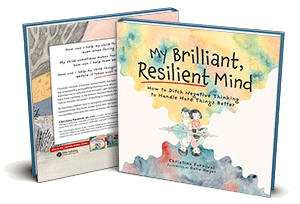Hi there! I’m Christina, a mom of three littles, a licensed mental health therapist, and a children’s book author! Thanks for checking out my site. Look around! I’m sure there’s something here for you! This guest post, written by Stacy Bryant, is about practical strategies for moms for overcoming the postpartum blues.
Overcoming the Postpartum Blues: Practical Strategies for Moms
Welcoming a newborn into your life is one of the most life-changing, beautiful experiences one can go through. You get to witness the miracle of life firsthand and experience what it means to hold a piece of you in your arms. However, directly layered underneath these priceless moments is also a flurry of emotions that can be overwhelmingly intense.
Many new mothers grapple with sadness, anxiety, or mood swings – these emotions, when present in the first couple weeks, are often called the postpartum blues or baby blues. If you’re a new mother experiencing these, it’s crucial to remember that you’re not alone. Studies indicate that up to 80% of new moms experience postpartum blues. This article aims to explore understanding the postpartum blues and provide practical strategies to navigate these feelings.
Understanding the Postpartum Blues
Postpartum Blues Defined
What exactly are postpartum blues? It’s a state of emotional turmoil that new mothers experience shortly after childbirth. You may feel an unexpected wave of sadness, anxiety, or frequent mood fluctuations. Factors contributing to postpartum blues could range from hormonal changes after delivery to adjusting to your new role as a mother, all while managing sleep deprivation.
Deciphering the Symptoms
The symptoms of postpartum blues often mimic those of clinical depression, making it essential to appropriately diagnose this condition. Common symptoms include mood swings, anxiety, sadness or feeling overwhelmed, crying spells, insomnia, changes in appetite, and reduced ability to concentrate.
Postpartum Blues vs. Postpartum Depression
While the symptoms might appear similar, postpartum blues and postpartum depression are two different experiences. Postpartum blues typically surface a few days after childbirth and dissolve within a few weeks. Postpartum depression, however, is characterized by more distressing feelings and can last for several weeks or even months if not treated. If your symptoms are severe and prolonged, don’t hesitate to contact a healthcare professional.
Practical Strategies for Overcoming Postpartum Blues
- Prioritizing Self-care and Recovery
The postpartum phase is demanding, and the onslaught of responsibilities that come with caring for a newborn might leave little room for you to prioritize your needs. But remember, your well-being is fundamental in riding this wave of transition. Listening to your body’s needs, maintaining a balanced and nutritious diet, and ensuring you rest adequately are all essential elements for your emotional well-being and recovery. - Embracing the Art of Delegation
Remember, Rome wasn’t built in a day — and not by one person. Delegating baby duties to your partner, family, or close friends isn’t a sign of weakness; instead, it’s a practical strategy to allow yourself some breathing space. A small time-out can refresh your mind and body, making you better equipped for managing your baby’s needs. - Seeking Emotional Support
Humans are social creatures, and feelings of isolation or loneliness can exacerbate baby blues. Talk about what you’re experiencing with your loved ones, or join a local or online postnatal support group. Voice your emotions, fears, and anxieties. More often than not, you’ll find fellow mothers going through similar experiences, offering you comfort, empathy, and reassurance. - Incorporating Mindfulness Practices
Integrating mindfulness practices into your routine can help foster mental peace and positivity. Some techniques to consider include:
Meditation: Regular meditation can help provide clarity, emotional stability, and relaxation. It helps to train the mind to be present in the moment and achieve a mental balance.
Deep breathing exercises: These exercises can provide a quick way to restore calm and reduce anxiety. By focusing on your breathing, you can gain control over your emotions and cope with stress more effectively.
Practicing gratitude: Acknowledging the good in your life often leads to a positive outlook and helps manage negative emotions. By regularly taking the time to appreciate what you have, you can cultivate a happier mindset and boost your overall well-being. - Limiting Social Media Consumption
Today’s digital world can sometimes place unrealistic expectations on new moms. Images of ‘picture-perfect’ mothers leading ‘picture-perfect’ lives can fuel stress and self-doubts. Remember, it’s okay not to conform to these unrealistic standards, and limiting your social media consumption can be an empowering step in focusing on your journey.
Seeking Professional Help
- Considering Therapy and Counseling
If baby blues extend beyond the initial weeks or the intensity of your feelings seems overwhelmingly high, seek professional help. Several therapeutic interventions, like Cognitive Behavioral Therapy (CBT) or counseling, have helped many women navigate their postpartum phase more comfortably. - Medication as an Aid
Medication, often antidepressants, could be an option when severe postpartum blues persist beyond typical duration and intensity. It’s important to discuss potential benefits and risks with your healthcare provider before starting any medication.
The Bottom Line
Experiencing a wave of emotions post-childbirth and riding out the baby blues is a common part of the profound journey to motherhood. The baby blues are a short-lived experience that almost every mom experiences. You are not alone!
Incorporate the strategies that resonate with you, talk about your feelings, and remember seeking help is a sign of strength. Have faith in your abilities, and remember that healthcare providers are always available to guide and assist you when needed. Take care, wonderful new Mama – remember, there’s a community here supporting you on this incredible journey.
Stacy Bryant is a passionate advocate for mental health and holistic well-being. She adds significant value by crafting insightful articles and compelling content for McDowell Counseling & Associates, a specialist provider of expert counseling services. In addition to this, Stacy also serves as the Content Manager at SpringHive Web Design Agency. Here, she excels as a dedicated content writer, using her expertise to create engaging narratives that captivate audiences and contribute to their brand identity. Stacy Bryant’s dedication to promoting mental wellness shines through in her writing, effectively merging her advocacy, counseling insights, and creative prowess to positively impact individuals and communities alike.


